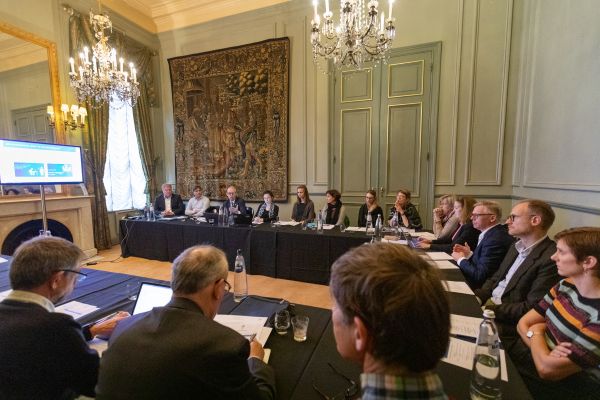On the eve of the SIP 2019 Symposium, SIP BE held its Steering Committee meeting. The aim of the meeting was to take the project forward, moving from a “start-up team” to a “steering committee”. All attendees agreed to this progression.
Bart Morlion (European Pain Federation EFIC)
B. Morlion opened the meeting by giving an overview of his responsibilities as President of the European Pain Federation EFIC and outlined the three priority focus areas:
- Education: He outlined the following actions that EFIC would focus on:
- The development of professional curricula, with the goal of making them the reference in member countries and having them used for exams
- The creation of pain schools in Europe
- The creation of the EFIC education platform
- The publishing of the European Journal of Pain (taking positions on, for example, opioids and cannabis)
- Research: promoting basic and clinical pain research
- Advocacy: The most important advocacy campaign is the SIP. He outlined EFIC’s past and planned activities, which include:
- The creation of policy documents, such as the SIP Framing Paper, the SIP Joint Statement, and the SIP Infographic.
- The four key themes, arising from the Joint Statement, namely: indicators, employment, research, and education.
- He highlighted the SIP successes which can be built on, and
- The creation of National SIP chapters, i.e. the aim of this meeting.
Furthermore, EFIC had also other campaigns such as the “On the Move” campaign (No. 5 – EFIC “On The move”) stressing the role of physical activity in the prevention and management of pain.
Saskia Decuman (RIZIV/INAMI)
S. Decuman outlined the objectives and characteristics of SIP BE:
- Compared to EU goals, national goals are more specific and geared at concrete policy recommendations.
- RIZIV/INAMI emphasised that good representation is crucial. All key organisations must be involved.
- The moment pain has an impact on normal functioning it falls within the scope.
- The aim for SIP BE is to organise different workstreams with organisations collaborating in workshops throughout 2020. These activities would end with a symposium to present their conclusions and recommendations.
Noting Grünenthal’s support in the project, S. Decuman clarified that a collaboration which includes a pharmaceutical company’s involvement, must be possible. She stressed that RIZIV/INAMI would be driving the project and its priorities, and that Grünenthal would only be focused on the logistics and facilitation of the workshops and the symposium. She added that, indeed, some organisations declined participation in SIP BE due to the involvement of a pharmaceutical company.
Saskia Decuman asked the room for ideas and recommendations on “How to go from start-up team to multi-stakeholder concept?”. She asked if there were any key organisations missing who should be invited. She then provided an overview of the current activities and initiatives regarding employment reintegration.
Outcome of further interactions with speakers and audience
Responding to a question about the involvement of representatives from the employer, employee (via Unions), and psychologist communities in SIP BE, Saskia Decuman offered to reach out to individuals involved in RIZIV/INAMI to ask for their recommendations for representation by these interest groups.
Responding to a question about the balance between SIP European and national activities, Bart Morlion explained how the current workings have been running. He noted that the large majority (98 percent) of national SIP platforms have decided to work autonomously on almost all of their activities. Nevertheless, the European umbrella allows for national chapters to learn from each other and exchange best practice. S. Decuman added that national platforms allow for more concrete possible recommendations when speaking to national authorities.
Responding to the legal status of SIP BE, the speakers noted that it is a collaboration platform that has no legal status. It is purely an initiative that organisations can choose to support. It was agreed that more clarity and communication was needed on this topic.
Regarding a request to integrate brain diseases into the scope of SIP BE, given the large overlaps, there was agreement to integrate the topic into one of the workstreams.
Responding to a question calling on more focus on prevention, S. Decuman acknowledged that the current focus is on reintegration of the workforce because this was their member representation. B. Morlion agreed that prevention can be part of the recommendations coming out of the workstreams.
Regarding the role of pharmacists in SIP BE, S. Decuman noted that the platform is not focused on pharmacy as such but can certainly be part of the focus on early detection and prevention.
Agreed Next Steps
The following was agreed:
- To plan four meetings in 2020
- Concerning the timing for the final symposium, participants agree that the end of 2020 was too short notice as it will need some context. There were no objections to the final symposium taking place in 2021.
- The location preference for the final symposium was the Belgian Parliament.
- It was requested that potential barriers and hurdles be outlined in the next meeting.
More information about SIP Belgium can be found in the poster session on SIP National Platforms (No. 2 – SIP Belgium poster).
